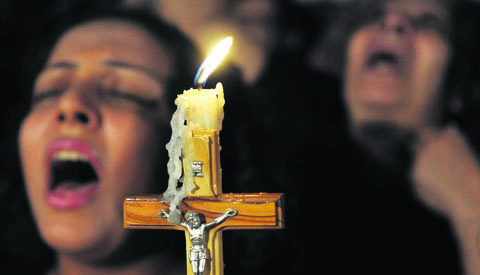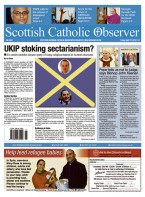November 14 | ![]() 0 COMMENTS
0 COMMENTS ![]() print
print

Helping people share in their own inheritance
A new organisation is seeking to encourage the use of chant in Scottish parishes. After a successful conference in Glasgow last November, Musica Sacra Scotland is preparing for its next event in Dundee on November 22. STRONG IN FAITH spoke to Paul Livingston, one of the young musicians involved, to find out what it is all about
Why is an organisation like Musica Sacra Scotland needed?
The main challenge is not hostility, it is generally lack of formation in Church music. If I think of my own background, I started playing organ as a volunteer and at that stage I really didn’t know anything about Liturgical music. It was only really by learning for myself that I was able to learn more. I grew up in three Scottish dioceses and I’d never heard a line of chant anywhere until just before the Papal visit and we were singing the Pater Noster and plainchant Kyrie. It was just a little taste of it, but it introduced me to the world of chant (above) and I was just taken by how beautiful it was. And at that stage, I remember suggesting a plainchant Agnus Dei to my then parish priest, and I didn’t realise how loaded and political an issue it was, and that the Church’s Liturgical music had become something of a battleground, and a football for different ideologies. It came as a shock.
Given this controversy, lack of exposure, how have people been reacting?
The reaction among young people has been especially positive. The reaction among children who have no preconceived ideas is quite remarkable, and the speed with which they pick up on chant and Latin pronunciation. It happens very naturally. It is quite easy to get children singing simple chant. And in fact, the reaction among young adults has been similarly positive. There are no ideological hang-ups.
‘There are a lot of good things are happening in Scotland already, and the work of Musica Sacra is to aid and complement that. People in parishes up and down the country are doing their very best every week, and—I think this is an important point—the first priority is to value what they are doing and perhaps to introduce them to other sources of the Church’s tradition, and to make them more independent. At the moment, there’s a situation where people are dependent on resources churned out by a fairly small group of commercial publishers, who have an interest in producing new material every few years. If people had a little more formation, they would be free to pick any book from the liturgical library. At the moment, the main obstacle in chant is that people can’t read the notation, so if people are taught to read notation then it would give them many more options.
My experience has invariably been that when people hear chant sung beautifully, and chant in English as well, then they always respond positively. But it has to come that way round: there’s nothing to gain by bashing people over the head with dusty chant tomes.
How does Liturgical music fit within the mission of the Church?
Here in Scotland, you would hear it said that music is not our priority and that other things are more important. In many ways I would agree with that. It is not our number one priority but it is a bit like cleaning the windows: it is not the priority, but if you don’t do it then it is going to obscure other aspects.
A key thing is that music, and the Church’s artistic tradition, could and should be used as part of the new evangelisation. It allows the Church to propose an entirely positive and joyful message to the world, and to challenge secularism by taking the artistic initiative. I think that sacred music is of itself an excellent form of Catechesis. If you listen to sacred music, if you enter into the spirit of it, if you read the texts, then it’s so theologically rich that it becomes an education in itself. It’s intrinsic to the prayer of the Church and to the Liturgy.
What are the next steps?
Musica Sacra Scotland is not any sort of cure all for Liturgical music. In many ways, it’s hopelessly piecemeal—an annual event and a couple of weekends are valuable, but they are only introductions. I think it would be good if the Church could offer a more rigorous and systematic means of forming Church musicians.
As a young Catholic and a young professional musician, I think there is something of a talent drain in the Catholic community. Young Catholic musicians who might have a lot to offer the Church are not really valued. There could be a better means by which their talents could be shared with the rest of the Church, and they could be given some Liturgical formation. A young Catholic musician who wants to be involved in Church music is far more likely to gravitate towards the Episcopal Church or the Church of Scotland.
The initiative has to come from the hierarchy, so it is great that Bishop Hugh Gilbert of Aberdeen is now the patron. As a monk of Pluscarden, he knows the Church’s musical heritage inside out. Bishop Stephen Robson of Dunkeld has been immensely supportive, and others as well.
It was really heartening that Archbishop Philip Tartaglia of Glasgow came to the conference last year, and opened it. It was quite special and moving for some of us that he was there to support what we were doing, and to say that this is something at the heart of the Church, that he values and wants to encourage. He spoke about his own love of particular pieces of chant and Liturgical music and he set out quite clearly what he would like to see in the archdiocese.
Something that has been lost is a unified repertoire among all Catholics, something that everybody can sing at any Mass. In an increasingly globalised age when people are travelling all the time, it becomes more and more important that we have something we can all sing together. The purpose of Musica Sacra Scotland is to help people share in their own inheritance.
— For more information about Musica Sacra
Scotland and the November 22 conference, visit www.musicasacrascotland.org.uk
— Want to have your say? Comment at https://www.facebook.com/scostronginfaith











